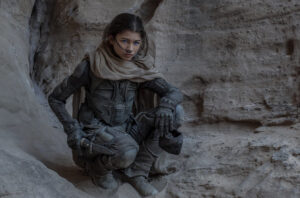If The Lord Of The Rings was once considered unfilmable, then the same is doubly true of Frank Herbert’s Dune – a sprawling novel which is (arguably) to sci-fi literature what The Lord Of The Rings is to fantasy. Dune is a searing deconstruction of the hero’s journey, a complex, multi-layered, and not entirely successful non-comedic satire of the white savior narrative and its weaponization by imperialist forces and Christian missionaries, and besides all that it’s also an extremely dense and literary book, which is probably most popular outside of its actual readership because of the imagery of giant alien sand-worms, which the 1984 adaptation helped to make iconic to a larger audience.

But Denis Villeneuve’s new adaptation of Dune for Warner Brothers (and HBO Max) seeks to make the classic story mainstream – and if that goal is at all attainable, then the newest full-length trailer for the film, released today, ought to do the trick. It’s clearly trying to divide its focus between satisfying fans of the original novel and luring in general audiences who just want a fun sci-fi movie. Unfortunately for Warner Brothers, the words “fun” and “Dune” are hardly synonymous, which is why I think this trailer very carefully highlights all the VFX-heavy shots of spaceship battles and cool fight sequences, without providing much context about what fills the gap between those scenes. The answer? Lots of weighty conversations about theology, geo-economic warfare, and intergalactic geopolitical strategy.
Oh yeah, and the aforementioned giant alien sand-worms, known in-universe as the Shai-Hulud; but those go hand-in-hand with the subject of geo-economic warfare (and environmental degradation hastened by human interference) for…reasons. Without getting into spoilers, let’s just say the Shai-Hulud are important to the plot and themes of Dune, but they’re also not in the book anywhere near as frequently as the cover art would likely lead you to believe. And to be honest, I don’t know if they’re gonna be in the movie that much, either. We see the same one from the first trailer, rising above Paul Atreides in the desert at night, and one or two in a battle from near of the end of the movie, but that’s it.
(And not to sound too down on this movie, but the design of the Shai-Hulud isn’t really doing anything for me. Maybe I’ve just seen too much incredible and creative artwork of the sand-worms at this point for Villeneuve’s baleen whale/lamprey hybrid approach to seem fresh to me, but I don’t know…I expected something a little more majestic).

Honestly, if anything’s going to get general audiences into theaters to see Dune, it’s the film’s ensemble cast. Almost everyone here has their own legion of adoring fans, with stars Timothée Chalamet and Zendaya being exceptionally strong in that regard: it’s unsurprising that Zendaya’s character, the warrior Chani who falls in love with Chalamet’s Paul, appears to be the second-most important character in the movie – a deviation from the book, where that honor arguably goes to Paul’s mother, the Bene Gesserit sorceress Lady Jessica. But Rebecca Ferguson need not fear that her character will be entirely sidelined: a Dune spinoff series focusing on the Bene Gesserit is still in production at HBO Max, and just picked up a new showrunner in Diane Ademu-John. It will explore the efforts of the Bene Gesserit to plant the seeds of a messiah myth on the desert planet of Arrakis that will manifest itself in Paul Atreides.
Hopefully, that gives you some idea of why this book is so very controversial, and why the movie has to be responsible in the way it depicts both its “hero”, Paul, and his followers, the indigenous Fremen of Arrakis who are explicitly MENA (Middle Eastern and North African)-coded, and draw influences from vastly disparate cultures across the world, including those of Native American peoples. Is Dune a white savior narrative, or is that only a surface-level reading of the story? But even if it isn’t, does it ever do enough to dismantle the white savior narrative it props up in parody, or expose the root issue of white supremacy? In depicting the Fremen as victims of their own superstitious beliefs, who is Herbert calling out? These are just some of the complicated questions one could raise about Dune, and the answers are bound to vary depending on who you ask.
One thing is clear, though: that too much of this story is too deeply rooted in the (intentional and at least theoretically critical) appropriation of MENA culture and particularly religion for the film to not recognize or respect that either in front of the camera or behind the scenes. There are no MENA actors in major roles, and no MENA writers working on the script. That kind of oversight is concerning regardless of the source material, but it also suggests that Villeneuve isn’t really interested in exploring what Dune has to say about white saviors, or refining it any further by centering MENA perspectives in this adaptation. And that’s especially frustrating.

It’s unfortunate, too, because Dune looks incredible otherwise – the kind of visionary epic that could redefine the sci-fi genre of film for a generation, just as the original book did for literature. Villeneuve had at one point detailed his plans for a trilogy of Dune films matching the vast scope of Peter Jackson’s The Lord Of The Rings, and I can only hope that if this franchise is allowed to expand (that will depend on its box-office performance and success on HBO Max, of course), that he takes great care to renovate parts of Herbert’s books which are not perfect and can be improved upon.
Trailer Rating: 8.5/10